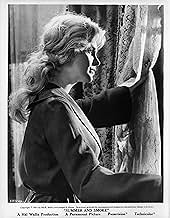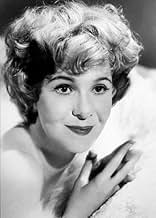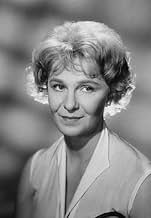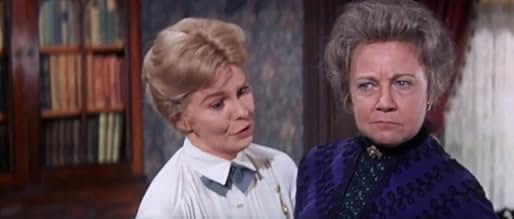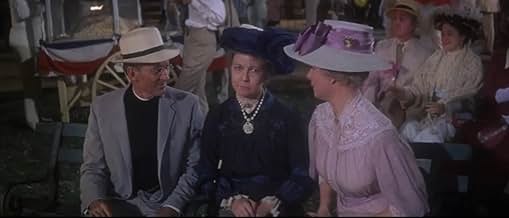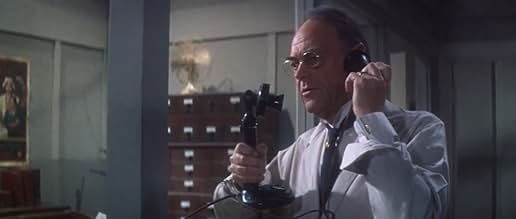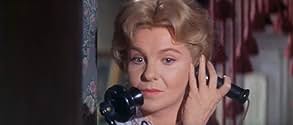CALIFICACIÓN DE IMDb
6.8/10
2.1 k
TU CALIFICACIÓN
Agrega una trama en tu idiomaA plain, repressed spinster falls for a dashing young medical student who prefers the wilder life, until it's too late.A plain, repressed spinster falls for a dashing young medical student who prefers the wilder life, until it's too late.A plain, repressed spinster falls for a dashing young medical student who prefers the wilder life, until it's too late.
- Dirección
- Guionistas
- Elenco
- Nominado a 4 premios Óscar
- 4 premios ganados y 10 nominaciones en total
Max Showalter
- Roger Doremus
- (as Casey Adams)
Rico Alaniz
- Knife Thrower
- (sin créditos)
Cheryl Anderson
- Alma as a Girl
- (sin créditos)
Lon Ballantyne
- Orderly
- (sin créditos)
John Barton
- Townsman
- (sin créditos)
Ray Beltram
- Cantina Patron
- (sin créditos)
Marjorie Bennett
- Saleslady
- (sin créditos)
Dick Bernie
- Drummer
- (sin créditos)
- Dirección
- Guionistas
- Todo el elenco y el equipo
- Producción, taquilla y más en IMDbPro
Opiniones destacadas
10Rogue-18
Set in a small, insular town in the deep South, this is a gripping drama of miscommunication and repressed passion. Geraldine Page's powerful performance becomes progressively more harrowing as her character, the spinsterish Miss Alma, struggles to forge a connection with the man she has always loved--the handsome, dissolute son of the town's respected doctor (Laurence Harvey, perfectly cast). In the process, lives are forever changed--in ways none of those involved could have predicted. Page is simply incredible in this movie, delivering a climactic soliloquy that will leave you emotionally shell-shocked.
Geraldine Page had her first true starring role in "Summer and Smoke" released in 1961. Yes, she had been a theatrical star and did television work, and did fine in 1953's "Hondo" opposite John Wayne. But here, Page brings the repressed Tennessee Williams character of Alma to glorious life. The story, set in the 1920's, deals with the Southern small town stifling morals of the day. Page is a preacher's daughter, making her even more repressed; her father is played by actor Malcom Atterbury with all the proper moral condemnation. Her mother, played by old Hollywood star Una Merkel, is mentally unbalanced, adding to the responsibility Alma feels, as she lives at home with both of them. Alma is at an age that would have been considered a "spinster" of the times. Enter the young handsome doctor John (Laurence Harvey), whom Alma has known since childhood, since he lives next door with his cantankerous doctor father (John McIntyre). Alma desires John, but her own sexual inhibitions will now allow her to explore that, so she secretly lusts after him. John is a fellow who focuses on the physical, and takes up with a woman who would have been considered quite loose at the time (Rita Moreno in an early performance). John knows Alma desires him, and he is not sure how to handle it. He tries to take the relationship further, but Alma resists his sexual advances. Neither of these individuals is wrong for how they feel - and they seem to go through the whole movie not connecting. This is probably the finest work Laurence Harvey did on screen - his smoldering sexuality is used here to great effect. He and Page have palpable chemistry. The supporting players are capable as well, but this is Geraldine Page's show, and her genteel demeanor and southern accent are spot on. We are left pondering Alma - she is both tragic and wonderful.
Tennessee Williams brilliant and expertly told tale of a woman and man whose moral standards or lack of standards never meet as they they both journey to opposite extremes.
The story is set in 1916. The lead role of a meticulous yet nervously self conscious reverend's daughter is skillfully portrayed by Geraldine Page. Her name is Alma, as she indicates early on, is Spanish for soul. Too highly moral minded to act on or even think of the physical acts of pleasure she exists in a fantasized world of the romanticized connection of souls. The realities of her life justify her mental escape. Her mother(Una Merkel) had a nervous breakdown some years back and is childishly stubborn. Alma to the outside observer purposely projects a maturity beyond her age as she has taken over many duties usually the responsibilities of a preacher wife. She also bears the duty of disciplinarian to her bratty, shoplifting, and childlike mother. She lives up to the responsibilities thrust upon her. Also she provides public vocal performances at special events and gives voice training lessons. In her fantasy she loves the young doctor next door with whom she grew up.
Her handsome neighbor John(Lawrence Harvey)is the son of the town doctor. He has recently finished his medical internship. He is morally the extreme opposite of Alma. He is a drinker, womanizer, gambler, and lacks any sense of responsibility. He has just returned to town and shows Alma a bit of interest but is is distracted by newest town slut Rosa Zacharius whose father owns a nearby casino featuring drinking, gambling, and what else one can only imagine. He is bewitched by Rosa(Rita Moreno). He still shows a mild interest in Alma.
He takes Alma to the Casino one night and she is horrified by the activities there. She is with John watching a cock fight and is sickened. Suddenly a spot of blood from the fighting roosters splashes on her blouse. She screams. Brilliant T.W. symbolism! The pure spinster being marked with the symbol of original sin. John and Alma walk outside to a secluded spot. They become rather excited by one another. Alma is about to give in to her physical desire but her pure and high morals overtake the moment and she runs off.
John and Rosa become engaged. One wonders why he thought he had to marry her since her character was one of the easiest conquests ever depicted.
John's father is in another part of the state treating victims of a deadly outbreak of illness as a volunteer, Alma alerts him about a wild party at his house. He returns home to find drunk people all over his property. He sees Rosa's father and starts beating the passed out man with his cane. He wakes up and shoots John's father. His father linger a few days and dies stating he does not forgive his son. Alma tells John she alerted his father to return home. John verbally assaults her with insulting dialog and blames her for his father's death.
Alma descends into deep and dark depression. Meanwhile John is shocked into the reality of the situation and takes up his father's volunteer work at the clinic. He returns a hero to take over his fathers practice as town physician.
Alma at this point has taken a dark journey. Her father asks her why she never dresses during the day and where she has been disappearing to at 2:00am. She reminds him of all the chores she does everyday and says,"what more do you want of me?" He says, "what will I tell people that ask about you?" Her startling reply is, "You can tell them I have changed. You don't yet know, how or why... but you may wish that I hadn't. The most important key scenes follow filled with amazing emotion and dialogue. Miss Page is at the top of her game in these scenes. Believe me Alma's father would have wished she hadn't changed. The final scene is lurid. Don't miss this underrated Tennessee Williams masterpiece.
The story is set in 1916. The lead role of a meticulous yet nervously self conscious reverend's daughter is skillfully portrayed by Geraldine Page. Her name is Alma, as she indicates early on, is Spanish for soul. Too highly moral minded to act on or even think of the physical acts of pleasure she exists in a fantasized world of the romanticized connection of souls. The realities of her life justify her mental escape. Her mother(Una Merkel) had a nervous breakdown some years back and is childishly stubborn. Alma to the outside observer purposely projects a maturity beyond her age as she has taken over many duties usually the responsibilities of a preacher wife. She also bears the duty of disciplinarian to her bratty, shoplifting, and childlike mother. She lives up to the responsibilities thrust upon her. Also she provides public vocal performances at special events and gives voice training lessons. In her fantasy she loves the young doctor next door with whom she grew up.
Her handsome neighbor John(Lawrence Harvey)is the son of the town doctor. He has recently finished his medical internship. He is morally the extreme opposite of Alma. He is a drinker, womanizer, gambler, and lacks any sense of responsibility. He has just returned to town and shows Alma a bit of interest but is is distracted by newest town slut Rosa Zacharius whose father owns a nearby casino featuring drinking, gambling, and what else one can only imagine. He is bewitched by Rosa(Rita Moreno). He still shows a mild interest in Alma.
He takes Alma to the Casino one night and she is horrified by the activities there. She is with John watching a cock fight and is sickened. Suddenly a spot of blood from the fighting roosters splashes on her blouse. She screams. Brilliant T.W. symbolism! The pure spinster being marked with the symbol of original sin. John and Alma walk outside to a secluded spot. They become rather excited by one another. Alma is about to give in to her physical desire but her pure and high morals overtake the moment and she runs off.
John and Rosa become engaged. One wonders why he thought he had to marry her since her character was one of the easiest conquests ever depicted.
John's father is in another part of the state treating victims of a deadly outbreak of illness as a volunteer, Alma alerts him about a wild party at his house. He returns home to find drunk people all over his property. He sees Rosa's father and starts beating the passed out man with his cane. He wakes up and shoots John's father. His father linger a few days and dies stating he does not forgive his son. Alma tells John she alerted his father to return home. John verbally assaults her with insulting dialog and blames her for his father's death.
Alma descends into deep and dark depression. Meanwhile John is shocked into the reality of the situation and takes up his father's volunteer work at the clinic. He returns a hero to take over his fathers practice as town physician.
Alma at this point has taken a dark journey. Her father asks her why she never dresses during the day and where she has been disappearing to at 2:00am. She reminds him of all the chores she does everyday and says,"what more do you want of me?" He says, "what will I tell people that ask about you?" Her startling reply is, "You can tell them I have changed. You don't yet know, how or why... but you may wish that I hadn't. The most important key scenes follow filled with amazing emotion and dialogue. Miss Page is at the top of her game in these scenes. Believe me Alma's father would have wished she hadn't changed. The final scene is lurid. Don't miss this underrated Tennessee Williams masterpiece.
I saw this movie at a theater in Springfield, Ohio, at the time of its original theatrical release. I don't know if memory makes things seem better than they really were but I rate this as the most memorable movies I have ever seen. I thought it was fantastic. I've not seen the video and I'm not sure that I would want to since this VHS edition is not letter-boxed. It would have a 1.33 aspect ratio instead of the wide, 2.35 aspect ratio of the original Panavision film. I think that would destroy much of the film's visual appeal. If this movie ever comes out on DVD, in the original Panavision aspect ratio, I'll be certain to buy it!
I wanted to see this film after reading reviews of "Splendor in the Grass", which claimed that the basic idea for that movie was borrowed by William Inge from Tennessee Williams' "Summer and Smoke". I love "Splendor," and wanted to see if the 'Bard of the Midwest' could possibly have copied from his friend's homework.
I think nearly all the films made from Tennessee Williams' plays reveal their stage origins, but none more so than "Summer and Smoke". Sometimes that theatricality works in a film's favour as it does in "A Streetcar Named Desire", but here, it put me off at first. Nonetheless, there are many things I do like about the film.
Set in a small town in Mississippi in the early 1900's, the story centres around Alma Winemiller (Geraldine Page), the daughter of a minister. She is in love with the boy next door, John Buchanan (Laurence Harvey), the son of the local doctor. Repressed emotionally, she believes that personal dignity is the most important thing of all; he on the other hand is adventurous and wild. While she stays at home nursing her mentally ill mother, he goes out into the world experiencing life to the full.
John returns and has affairs with other women, including Rita Marino's Rosa Zacharias in a couple of over-the-top sequences. Alma is crushed, but although both eventually come around to the other's way of thinking, in the end they are just as apart as they were in the beginning.
Although Inge probably saw "Summer and Smoke" when it opened on Broadway in the late 40's, any influence was slight to say the least. As far as the two movies are concerned, "Splendor" is the more accessible work while "Smoke" struggles to overcome its stage roots.
"Summer and Smoke" does picks up the pace along the way, and the two leads are good together. Geraldine Page is an unusually arresting actress, and repeats her role from the stage. She has some tough speeches to deliver, but the vulnerability of her character is painful to watch.
I've always found Laurence Harvey a terrific screen presence, but a number of his peers from British cinema and theatre would disagree - some even thought him a bad actor. Maybe they got his roles on-screen mixed up with his life off-screen. However, there could also have been sour grapes involved; he was very good-looking, had a great voice and the camera loved him; he gives a confident performance in this film.
I knew Elmer Bernstein's score long before I saw the movie. It is a beautiful and nostalgic work with a heart-wrenching main theme. The music gives a haunting sense of loss to the film, offsetting the static sets and overlit photography. It shows the power of music to enhance a film.
"Summer and Smoke" presents some challenging ideas. It's not the best translation of Tennessee Williams to the screen, but more than one scene stays in the memory.
I think nearly all the films made from Tennessee Williams' plays reveal their stage origins, but none more so than "Summer and Smoke". Sometimes that theatricality works in a film's favour as it does in "A Streetcar Named Desire", but here, it put me off at first. Nonetheless, there are many things I do like about the film.
Set in a small town in Mississippi in the early 1900's, the story centres around Alma Winemiller (Geraldine Page), the daughter of a minister. She is in love with the boy next door, John Buchanan (Laurence Harvey), the son of the local doctor. Repressed emotionally, she believes that personal dignity is the most important thing of all; he on the other hand is adventurous and wild. While she stays at home nursing her mentally ill mother, he goes out into the world experiencing life to the full.
John returns and has affairs with other women, including Rita Marino's Rosa Zacharias in a couple of over-the-top sequences. Alma is crushed, but although both eventually come around to the other's way of thinking, in the end they are just as apart as they were in the beginning.
Although Inge probably saw "Summer and Smoke" when it opened on Broadway in the late 40's, any influence was slight to say the least. As far as the two movies are concerned, "Splendor" is the more accessible work while "Smoke" struggles to overcome its stage roots.
"Summer and Smoke" does picks up the pace along the way, and the two leads are good together. Geraldine Page is an unusually arresting actress, and repeats her role from the stage. She has some tough speeches to deliver, but the vulnerability of her character is painful to watch.
I've always found Laurence Harvey a terrific screen presence, but a number of his peers from British cinema and theatre would disagree - some even thought him a bad actor. Maybe they got his roles on-screen mixed up with his life off-screen. However, there could also have been sour grapes involved; he was very good-looking, had a great voice and the camera loved him; he gives a confident performance in this film.
I knew Elmer Bernstein's score long before I saw the movie. It is a beautiful and nostalgic work with a heart-wrenching main theme. The music gives a haunting sense of loss to the film, offsetting the static sets and overlit photography. It shows the power of music to enhance a film.
"Summer and Smoke" presents some challenging ideas. It's not the best translation of Tennessee Williams to the screen, but more than one scene stays in the memory.
¿Sabías que…?
- TriviaHal Wallis Productions bought the film rights to the play in 1952, shortly before its Off-Broadway revival, for $100,000.
- ErroresWhen Nellie Ewell first comes to Alma's house, Nellie's ponytail changes from waist length to mid back length in between shots.
- Citas
John: Eternity? What does it mean?
Alma as a Girl: It's something that goes on and on - when life and death and everything else, is all through with.
John: Aw, there's no such thing.
Alma as a Girl: Oh, but there is. It's what people's souls live in. When they leave their bodies.
- ConexionesFeatured in Cinema: Alguns Cortes - Censura III (2015)
Selecciones populares
Inicia sesión para calificar y agrega a la lista de videos para obtener recomendaciones personalizadas
- How long is Summer and Smoke?Con tecnología de Alexa
Detalles
- Fecha de lanzamiento
- País de origen
- Idiomas
- También se conoce como
- Summer and Smoke
- Locaciones de filmación
- Productora
- Ver más créditos de la compañía en IMDbPro
- Tiempo de ejecución1 hora 58 minutos
- Relación de aspecto
- 2.35 : 1
Contribuir a esta página
Sugiere una edición o agrega el contenido que falta

Principales brechas de datos
By what name was Verano y humo (1961) officially released in India in English?
Responda

